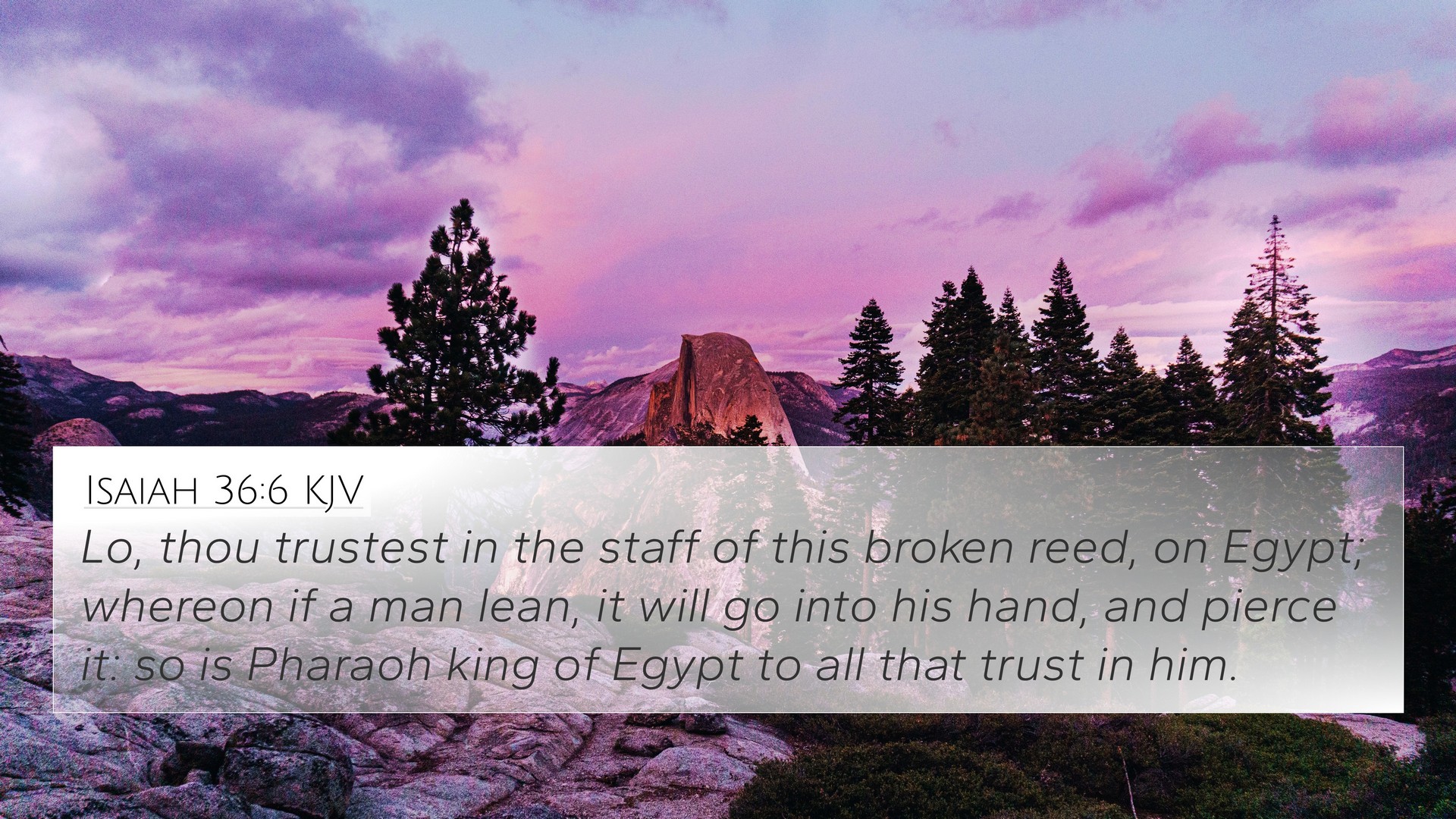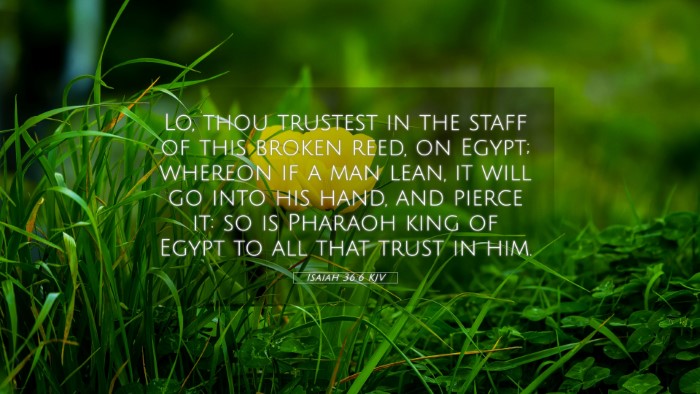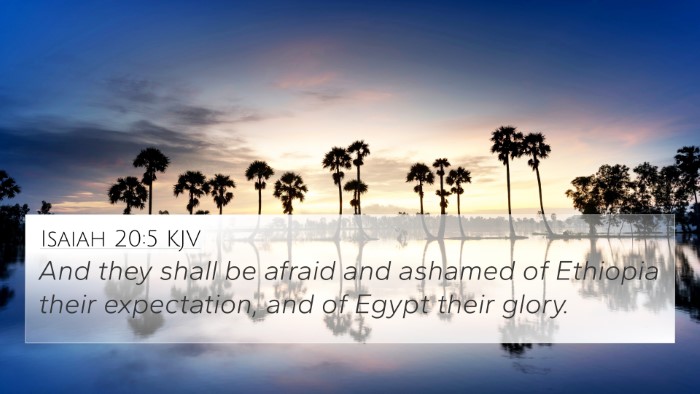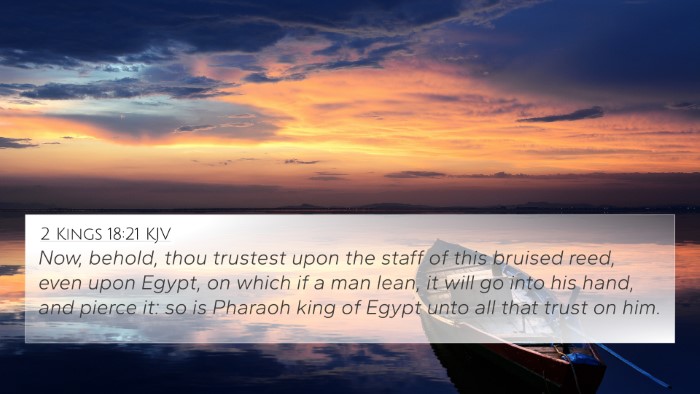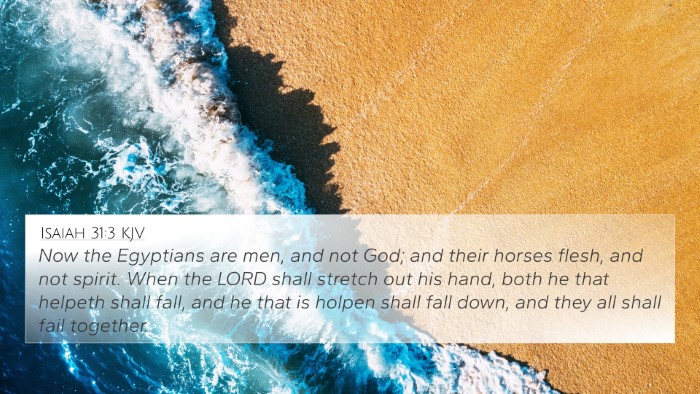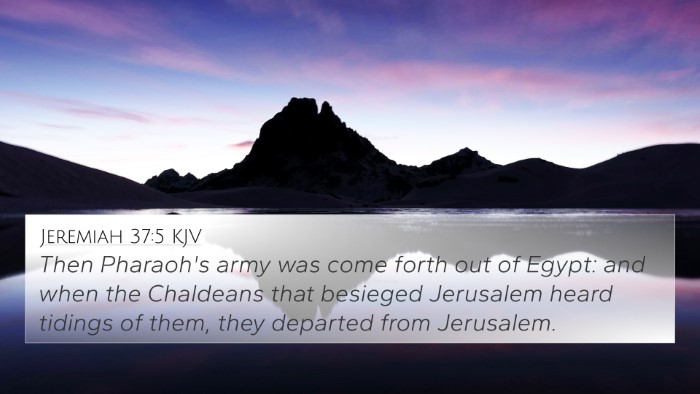Understanding Isaiah 36:6
Isaiah 36:6 states:
"Behold, thou trustest in the staff of this broken reed, on Egypt; whereon if a man lean, it will go into his hand, and pierce it: so is Pharaoh king of Egypt to all that trust in him."
This verse is a powerful commentary on misplaced trust and the futility of relying on human power instead of divine strength. Below is a summary of the insights gathered from public domain commentaries, including interpretations by Matthew Henry, Albert Barnes, and Adam Clarke.
Verse Meaning
Isaiah 36:6 serves as a metaphor highlighting the dangers associated with relying on Egypt as an ally against the Assyrians. It uses the imagery of a "broken reed" to illustrate the fragility and unreliability of Egyptian support.
Commentary Insights
-
Matthew Henry:
Henry emphasizes that the Egyptians, represented as a broken reed, offer no real strength to those who lean on them. Trusting in Egypt is depicted as ultimately self-destructive for Judah, akin to leaning on a splintered stick that causes harm.
-
Albert Barnes:
Barnes focuses on the absurdity of depending on an alliance with Egypt, explaining that this alliance comes from a lack of faith in God’s power. He furthers the idea that reliance on such an unstable ally will only lead to disappointment and pain.
-
Adam Clarke:
Clarke points out that the phrase “it will go into his hand” symbolizes the painful outcome of trusting in unreliable human support. He argues that God’s providence is far superior to human plans and alliances.
Thematic Bible Verse Connections
This verse can be cross-referenced with several other scriptures that underscore similar themes of trust, reliance, and the consequences of seeking human help over divine intervention. Here are some significant examples:
- Jeremiah 17:5-6: "Thus saith the Lord; Cursed be the man that trusteth in man... For he shall be like the heath in the desert."
- Psalms 146:3: "Put not your trust in princes, nor in the son of man, in whom there is no help."
- Proverbs 3:5: "Trust in the Lord with all thine heart; and lean not unto thine own understanding."
- 2 Kings 18:21: "Now, behold, thou trustest upon the staff of this broken reed, even upon Egypt."
- Isaiah 31:1: "Woe to them that go down to Egypt for help; and stay on horses, and trust in chariots, because they are many."
- Isaiah 20:5: "And they shall be afraid and ashamed of Ethiopia their expectation, and of Egypt their glory."
- Matthew 7:24-27: "Therefore whosoever heareth these sayings of mine, and doeth them, I will liken him unto a wise man, which built his house upon a rock."
Comparative Bible Verse Analysis
The theme of relying on God rather than humans is extensive throughout the Bible. A closer analysis of Isaiah 36:6 in relation to the cross-references listed reveals a consistent narrative across the Old and New Testaments.
In essence, the Scripture encourages believers to seek refuge in the Lord and not to be misled by the temporary allure of external alliances that offer no real security.
Conclusion
Isaiah 36:6 is a powerful reminder that true strength comes from faith in God rather than from inadequate human resources. It encourages believers to evaluate their sources of trust. The inter-Biblical dialogue between these verses invites deeper reflection on the importance of spiritual reliance.
Tools for Bible Cross-Referencing
For those interested in further exploring connections between Bible verses, here are some resources that can assist in cross-referencing:
- Bible concordance
- Bible cross-reference guide
- Cross-reference Bible study materials
- Bible reference resources for thematic studies
By understanding the context and meanings behind Isaiah 36:6, readers can gain insights into their walk of faith and the power of divine reliance compared to human dependency.
Further Explorations
Believers are encouraged to engage with the Bible actively, seeking how to cross-reference and analyze scripture as a method of deepening understanding:
- How to find cross-references in the Bible
- Identifying connections between Old and New Testament
- Detailed cross-reference between Gospels
- Cross-referencing Psalms with New Testament teachings
